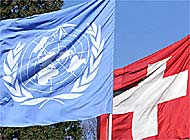This week in Switzerland

A new government effort to lead Switzerland into the United Nations has dominated the news in Switzerland this week. The other top stories include the publication of new figures on money laundering and two international conferences.
The government’s latest bid to break Switzerland’s isolationist stance and lead the country into the United Nations was launched by the foreign minister, Joseph Deiss, on Thursday.
He announced the start of a wide-ranging consultation procedure, during which political parties, organisations and the business community will be invited to give their opinion on one of the government’s top policy goals. Swiss voters will have the final say, possibly in 2002.
The foreign minister said membership in the world body would allow Switzerland to defend its interests better, without jeopardising its traditional neutrality or committing itself to take part in international peacekeeping missions.
In 1986, the electorate overwhelmingly rejected membership of the UN. Switzerland is one of the last sovereign states to stay out of the world body, even though it is a major financial contributor and hosts the organisation’s European headquarters in Geneva.
Geneva was also in the limelight as the venue for a week-long UN summit aimed at combating world poverty and promote equality. The nearby mountain resort of Crans-Montana also hosted an annual forum at which politicians gathered to discuss the benefits and pitfalls of globalisation. The main focus of this year’s meeting was the future of the Balkans and the situation in Africa.
As discussions about banking secrecy and tax evasion are continuing, the federal authorities announced the latest figures on suspected money laundering cases in Switzerland. The number of reported cases has almost doubled to 370 in the past year, involving about SFr1.5 billion.
But the Federal Banking Commission said the increase did not mean more money was being laundered, but that money laundering had become a riskier business.
Attention also focused on Switzerland’s large foreign population. A survey commissioned by the justice ministry found that 51 per cent of the population was planning to vote in favour of limiting the proportion of foreign residents to 18 per cent of the population, when the issue is put to a nationwide vote later this year.
One of the main political parties in government, the right-wing People’s Party, hinted it would not help combat the people’s initiative. A vote in favour would not only be embarassing put impractical, as foreign residents currently make up 19.3 per cent of the population, and a shortage of labour in certain branches is forcing many companies to look abroad.
by Urs Geiser

In compliance with the JTI standards
More: SWI swissinfo.ch certified by the Journalism Trust Initiative

You can find an overview of ongoing debates with our journalists here. Please join us!
If you want to start a conversation about a topic raised in this article or want to report factual errors, email us at english@swissinfo.ch.